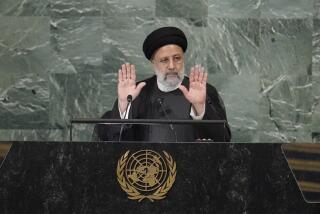On verge of a nuclear deal, Iran appears to harden its stance
GENEVA — Iran appeared Thursday to be stiffening its demands in negotiations aimed at curbing its nuclear program, even amid signs that the seven countries at the bargaining table might be close to a deal.
Deputy Foreign Minister Abbas Araqchi said Iran demanded that world powers begin easing oil and banking sanctions quickly as part of the preliminary deal that has been under discussion for five weeks. He also said Iran wanted the six world powers at the talks to recognize what Tehran sees as its entitlement to enrich uranium.
“We will not enter into an agreement that does not include enrichment from the beginning to the end,” he said in an interview with the government-controlled Iranian Student News Agency.
Accepting such conditions would be a major concession for the United States and its negotiating partners. The major powers have insisted they would not ease the “core” oil and banking sanctions in any interim deal. And they have suggested that they might be persuaded to allow enrichment by Iran at the end of the comprehensive deal-making, but not in the opening phase.
The six countries — China, Russia, the United States, France, Britain and Germany — are offering Iran a limited easing of sanctions on its economy if it accepts limits on its nuclear program while the final accord is negotiated. Many nations believe Iran is seeking nuclear weapons capability, despite its denials.
This first-phase deal is aimed at freezing progress on Iran’s nuclear program during negotiations of a final agreement.
In a potentially worrisome sign for the Obama administration, Senate Majority Leader Harry Reid said Thursday that he would support consideration of new sanctions legislation in the Senate beginning early next month.
Speaking on the Senate floor, Reid said that though he supported the administration’s diplomatic efforts, he wanted to maintain pressure on Iran to acquiesce in negotiations. “I believe we must do everything possible to keep Iran from getting nuclear weapons capability,” he said.
The administration has urged lawmakers to at least temporarily withhold new economic penalties on Iran while the talks continue, for fear that they would drive Tehran from the negotiating table or break apart the coalition of countries that have been cooperating on sanctions. Reid’s announcement, which in part reflects the strong bipartisan support in Congress for penalties, puts new pressure on the administration and the other countries to complete a deal this month.
Araqchi, in comments to reporters during a break in the talks, said the Iranians had “lost our trust” in the six world powers because of what they saw as abrupt changes in demands during the last round of talks early this month.
“We cannot enter serious talks until trust is restored,” he said.
Araqchi’s comments could be a last-minute negotiating maneuver aimed at gaining a slight advantage before the deal is officially sealed, perhaps as early as Friday, analysts said. But they could also mark a hardening of the Iranian negotiating team’s position after consultations with top officials in Tehran over the last 10 days, after the unsuccessful end of the last round of talks.
Ray Takeyh, an Iran specialist at the Council on Foreign Relations in Washington, said that in addition to Araqchi’s demands, “the rhetoric in Iran itself seems to be getting harder.”
“There are more vocal calls for getting greater concessions. That may impact how the negotiators are approaching their task.”
Despite the signs of tension, diplomats said the two sides were carrying on detailed discussions in the meetings, which came in the second day of this round of talks. Foreign ministers of the six countries, including U.S. Secretary of State John F. Kerry, were poised to fly to Geneva if the talks reach a deal, diplomats said.
Several world leaders and negotiators, including British Foreign Secretary William Hague and Iranian Foreign Minister Mohammad Javad Zarif, have said that a deal was close. U.S. officials have been more cautious, saying that they wanted to take their time to negotiate “the best deal.”
The signals coming from Iran have been mixed. Although Zarif has urged the world to act on their “historic” opportunity to reach an agreement, Iran’s supreme leader, Ayatollah Ali Khamenei, delivered a harsh speech Wednesday denouncing the United States and said he would not budge “one iota” on Iran’s “red line” demands.
More to Read
Sign up for Essential California
The most important California stories and recommendations in your inbox every morning.
You may occasionally receive promotional content from the Los Angeles Times.











